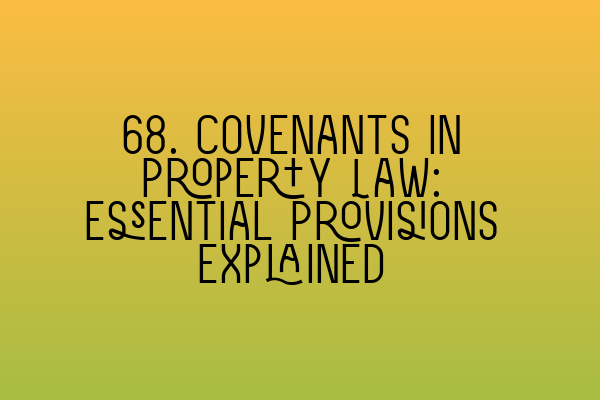68. Covenants in Property Law: Essential Provisions Explained
When it comes to property law, covenants play a significant role in regulating the rights and obligations of property owners. Covenants are legal agreements that impose certain responsibilities or restrictions on the use of property. These provisions are essential for maintaining the value, integrity, and harmony of real estate developments. In this blog post, we will explore the essential provisions of covenants in property law, providing you with a comprehensive understanding of their importance and implications.
1. Restrictive Covenants:
Restrictive covenants are provisions that limit the use of property in specific ways. They aim to maintain the character and quality of a development for the benefit of all property owners. Common examples include restrictions on the type of buildings that can be constructed, the height and size of structures, or even the use of property for commercial purposes. Restrictive covenants are often included in the original deeds of a development and can have long-term effects on the use and saleability of the property. It is crucial for buyers, sellers, and property developers to be aware of these restrictions to avoid legal complications in the future.
2. Positive Covenants:
Positive covenants, on the other hand, require property owners to take specific actions or maintain certain conditions on their properties. These covenants are designed to ensure the proper upkeep and maintenance of the development as a whole. Examples of positive covenants may include obligations to contribute to the maintenance of common areas, keeping properties in good repair, or adhering to architectural guidelines. Positive covenants are important in preserving the aesthetics and functionality of a property development, enhancing its overall value.
3. Enforceability of Covenants:
For a covenant to be enforceable, it must satisfy certain legal requirements. Firstly, the covenant must be made between parties who have the necessary legal interest in the property. Typically, this would involve the original developer or seller of the property and subsequent owners. Additionally, the covenant must have been intended to benefit the land itself rather than a particular individual. Finally, there must be an intention to bind future owners. This means that covenants can continue to be enforceable even if the original party who entered into the covenant is no longer involved in the property. As property values and ownership change hands, it is crucial to be aware of any existing covenants and understand their implications.
4. Breach of Covenants:
The breach of a covenant can have serious consequences and may result in legal action being taken against the defaulting party. Remedies for a breach of covenant can include damages, injunctions, or potential forced compliance. It is important to note that enforcing covenants can be complex, and it often requires expert legal advice. If you believe there has been a breach of covenant or you are facing allegations of breaching a covenant, it is imperative to seek professional assistance to protect your rights and interests.
5. Changing or Removing Covenants:
In certain circumstances, it may be possible to change or remove existing covenants. This typically requires the agreement of all parties with an interest in the land. Alternatively, an application can be made to the Upper Tribunal (Lands Chamber) to modify or discharge a covenant if it no longer serves a valid purpose or is impeding the reasonable use of the land. This process can be complex and involves a careful consideration of the facts and legal arguments. Seeking the guidance of experienced property law professionals is crucial to navigate this process successfully.
In conclusion, covenants are essential provisions in property law that regulate the rights and responsibilities of property owners. Restrictive covenants help maintain the character and quality of a development, while positive covenants ensure the proper maintenance and upkeep of properties. Understanding the enforceability, implications, and potential remedies for breach of covenants is crucial for all parties involved. If you require assistance with property covenants or any other property law matters, do not hesitate to contact SQE Property Law & Land Law. Our team of experienced solicitors and property law experts are here to provide you with professional legal advice and assistance.
Related Articles:
– SQE 1 Practice Exam Questions
– SQE 1 Practice Mocks FLK1 FLK2
– SQE 2 Preparation Courses
– SQE 1 Preparation Courses
– SRA SQE Exam Dates
